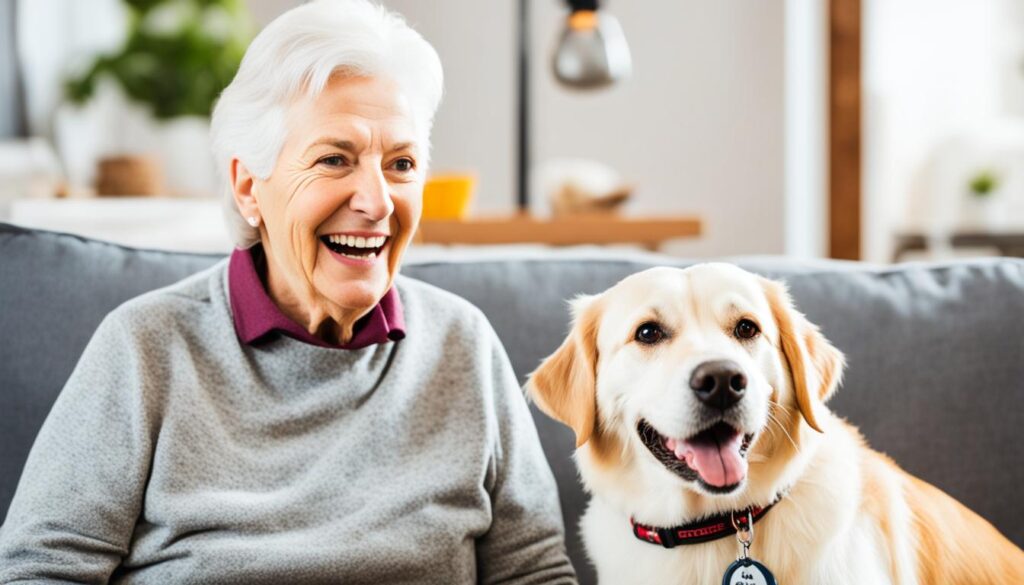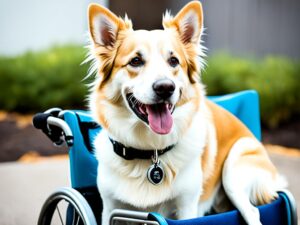
Did you know that November is Adopt A Senior Dog Month? As you consider opening your heart and home to a furry friend, it’s important to recognize the significance of adopting older dogs. Senior dogs bring a unique and rewarding companionship to your life, with their calmness, patience, and sweet demeanour. But what do you need to know to ensure a smooth transition and proper care for your new aging companion? Let’s explore the key items and tips for adopting a senior dog.
Key Takeaways:
- November is Adopt A Senior Dog Month, highlighting the importance of giving older dogs a loving home.
- Senior dogs make wonderful companions due to their calmness, patience, and sweet demeanor.
- Adopting a senior dog requires thoughtful consideration and preparation.
- Providing a loving home and addressing their specific needs ensures a fulfilling and joyful life for your aging companion.
- The benefits of adopting a senior dog are immeasurable, including the unconditional love and gratitude they offer.
Essential Supplies for Senior Dogs
When adopting a senior dog, it’s crucial to have the necessary supplies to provide for their specific needs. These supplies include:
- An orthopedic bed: A comfortable bed with orthopedic support is essential to alleviate joint pain and provide a restful sleep for your senior dog.
- Senior-specific toys: Choose toys designed for older dogs, such as puzzle toys and interactive games, to keep them mentally stimulated and engaged.
- Healthy treats: Bond with your senior dog and meet their nutritional needs with treats specially formulated for older dogs. Look for treats that promote joint health and offer dental benefits.
- Raised dishes: Elevated food and water dishes make eating easier for senior dogs with mobility issues or arthritis, reducing strain on their neck and joints.
- Pet ramps or stairs: Help your senior dog navigate furniture or vehicles safely with ramps or stairs designed for their specific needs.
- Grooming supplies: Keep your senior dog clean and comfortable with grooming tools such as brushes, nail clippers, and pet-friendly shampoos.
- High-quality food: Choose a premium dog food that is tailored to the nutritional needs of senior dogs. Look for formulas that support joint health and promote cognitive function.
- Dental products: Maintain your senior dog’s oral health with dental chews, toothbrushes, and toothpaste formulated for dogs. Good dental hygiene is essential, as older dogs are more prone to dental problems.
Providing these essential supplies will ensure that your senior dog receives the care and support they need to thrive in their golden years.
Tips for Senior Dog Care:
- Monitor their behavior and make adjustments accordingly: Senior dogs may experience changes in their behavior, such as decreased activity levels, increased sleeping, or signs of joint pain. Pay attention to these cues and adapt their care routine accordingly.
- Provide companionship: Senior dogs thrive on companionship and love to spend time with their owners. Make sure to dedicate quality time for bonding and engaging in activities that your senior dog enjoys.
- Regular exercise: Although their energy levels may be lower, regular exercise is still important for senior dogs. Choose low impact exercises like gentle walks and swimming to keep them active and maintain muscle tone.
- Regular vet check-ups: Senior dogs should have biannual veterinary check-ups to monitor their health, catch any potential issues early, and adjust their care plan accordingly.
- Adjust their diet: Consult with your veterinarian to find a senior dog food that meets their specific dietary requirements. Senior dogs may need a diet that supports joint health, promotes cognitive function, and helps maintain a healthy weight.
By providing the essential supplies and following these senior dog care tips, you can ensure a happy and healthy life for your aging canine companion.
Senior Dog Health and Care
Senior dogs require extra attention to maintain their overall health and well-being. Regular veterinary check-ups, including twice-yearly appointments, are essential to monitor their health and address any potential issues. Adopting a senior dog brings the benefit of a more relaxed and settled companion, and their mature behavior often makes them easier to integrate into a home.
However, it’s important to be prepared for potential health challenges that may arise. Dental disease and age-related conditions like arthritis are common in senior dogs. Providing proper nutrition, exercise, and joint supplements can help support their vitality and overall well-being.
The Benefits of Adopting a Senior Dog
“Senior dogs have a wealth of love and gratitude to offer. Adopting a senior dog is not just a rewarding experience for the dog, but for the owner as well.”
When you adopt a senior dog, you’re offering them a chance for a comfortable and loving home in their twilight years. These older dogs often come with a calm and settled demeanor, making them a perfect fit for individuals or families looking for a more relaxed companion.
Besides the emotional rewards, there are practical benefits to adopting a senior dog. Unlike puppies, senior dogs are typically housetrained and have passed the destructive chewing stage. They tend to adapt quickly to their new environment, making the integration process smoother.
Senior dogs can bring an immense amount of joy and companionship to their new owners. Their gratitude for being given a second chance often results in a strong bond and unconditional love.
Senior Dog Adoption Process
- Research local animal shelters and rescue organizations that have senior dogs available for adoption.
- Contact the organizations and inquire about their adoption process, requirements, and any specific information about the senior dogs in their care.
- Visit the shelter or rescue organization to meet the available senior dogs and interact with them to find the right match.
- Complete the necessary paperwork, including an adoption application and potentially a home visit, to ensure the dog will be going to a safe and suitable environment.
- Paying the adoption fee and signing the adoption agreement to finalize the process.
Once the adoption process is complete, it’s important to provide your new senior dog with the care and attention they need. Establish a routine, provide a comfortable living environment, and continue to prioritize their health through regular veterinary care, proper nutrition, and exercise.
| Senior Dog Adoption Process Checklist |
|---|
| Research local animal shelters and rescue organizations |
| Contact organizations and inquire about adoption process |
| Visit the shelter and meet senior dogs |
| Complete necessary paperwork and home visit |
| Pay adoption fee and sign adoption agreement |
Adopting a senior dog is a rewarding experience that benefits both the dog and the adopter. With proper care and attention, senior dogs can continue to live happy and fulfilling lives in their new homes.
Preparing Your Home for a Senior Dog
Before bringing home a senior dog, it’s essential to create a safe and comfortable environment for them to thrive. By making a few adjustments to your home, you can ensure that your new companion can navigate their surroundings with ease and enjoy their golden years to the fullest.
1. Install Safety Gates
Block off areas with stairs or potential hazards by installing safety gates. This will help prevent your senior dog from accessing areas that may pose a risk to their well-being.
2. Slip-Resistant Flooring
Ensure that the flooring in your home is slip-resistant to prevent accidents or injuries. Consider using rugs or mats with non-slip backing, especially on slippery surfaces like tile or hardwood floors.
3. Secure Medications and Toxic Items
Keep all medications, cleaning products, and potentially toxic items securely stored and out of your senior dog’s reach. This will help protect them from accidental ingestion or exposure.
4. Make Mobility Adjustments
If your senior dog has mobility limitations, make necessary adjustments to accommodate their needs. Provide ramps or stairs to help them access furniture or outdoor spaces, and ensure that pathways are clear of obstacles.
5. Designate Pee Pads
Senior dogs may have difficulty holding their bladder for extended periods. Designate specific spots in your home for pee pads to ensure your senior dog can relieve themselves comfortably.
6. Cozy Resting Spots
Provide multiple cozy resting spots throughout your home with orthopedic beds and blankets. These comfortable areas will help support your senior dog’s aging joints and provide them with a sense of security.
Creating a senior-friendly home will not only ensure your senior dog’s comfort but also help foster a sense of well-being and happiness. By taking these simple steps, you’ll be able to create a safe and loving environment for your aging companion to thrive in.
The Benefits of Adopting a Senior Dog
Adopting a senior dog offers numerous benefits. These mature dogs are typically housetrained and past the destructive chewing stage, making them easier to live with. Senior dogs are more laid-back and often prefer leisurely walks and relaxation over high-energy activities.
Many shelters offer reduced adoption fees for senior dogs, and the feel-good factor of providing a loving home for an older dog is immeasurable. The gratitude and affection shown by a senior dog who has been given a second chance can bring immense joy to their new owner.
Embrace the opportunity to experience the unique companionship that senior dogs provide and reap the rewards of their love and loyalty.
Quoted Testimonials from Senior Dog Owners
“Adopting my senior dog has been one of the best decisions I’ve ever made. He brings so much love and happiness into my life every day.”
– Jessica Thompson, proud owner of Charlie, a 9-year-old senior dog
“I can’t imagine my life without my senior dog. She’s the perfect companion, always by my side and ready for cuddles.”
– Michael Rodriguez, proud owner of Bella, an 11-year-old senior dog
The Joys of Senior Dog Companionship
- Senior dogs are often more calm and well-behaved, making them ideal companions for individuals or families.
- They offer a sense of security and comfort, especially for those seeking a loyal and devoted pet.
- Seniors dogs can provide emotional support and companionship, easing feelings of loneliness and anxiety.
- Their relaxed demeanor makes them perfect for individuals with a more laid-back lifestyle.
- Adopting a senior dog allows you to make a significant impact on their quality of life and provide them with a loving home for their golden years.
Considerations for Senior Dog Adoption
Before adopting a senior dog, it’s important to consider several factors. Adopting a senior dog can be a rewarding experience, but it also comes with unique responsibilities and considerations. By understanding these factors upfront, you can make an informed decision and provide the best care for your new furry friend.
Socialization and Compatibility
When adopting a senior dog, it’s essential to assess their socialization skills and compatibility with your lifestyle. Evaluate their behavior towards other animals, children, and strangers to ensure a smooth transition into your home. Some senior dogs may require extra training and patience, while others may already be well-adjusted and sociable.
Remember, senior dogs have diverse personalities just like younger dogs, so it’s important to find a match that suits your lifestyle and preferences.
Medical Considerations
Senior dogs often come with a higher likelihood of health issues compared to younger dogs. Before adopting, consider the potential medical expenses, including veterinary visits, medications, and specialized care. Be prepared to provide any necessary accommodations and treatments to keep your senior dog healthy and comfortable.
Senior dog adoption may also require additional financial resources for routine care, such as regular check-ups, vaccinations, and dental cleanings. It’s crucial to factor in these costs when considering adoption.
Time and Commitment
Senior dogs may require more attention and care, including regular exercise, grooming, and monitoring. Consider your availability and willingness to dedicate time to meet their needs. While senior dogs may not require the same level of physical activity as younger dogs, they still need mental stimulation and companionship.
Adopting a senior dog is a commitment that requires love, patience, and understanding. Be sure you have the time and resources to provide the care and attention they deserve.
Emotional Rewards
Adopting a senior dog can be a deeply fulfilling experience. These wise and loving companions often show immense gratitude for finding a forever home later in life. Despite any potential challenges, the emotional rewards of providing a loving and comfortable environment for a senior dog are immeasurable.
Remember, every senior dog deserves a second chance at a happy and fulfilling life. By considering these factors, you can make an informed decision and provide a loving home for a senior dog in need.
Senior Dog Adoption Checklist
To ensure a smooth transition and provide the best care for your newly adopted senior dog, it’s helpful to have a checklist of essential supplies. This checklist includes:
| Supplys | Description |
|---|---|
| Orthopedic bed | A comfortable bed that provides support for senior dogs’ aging joints. |
| Slip-resistant socks or booties | Helps prevent slipping on slippery surfaces and provides stability. |
| Ramps or stairs | Assist with easy access to furniture and elevated surfaces. |
| Lifting harness for larger dogs | Makes it easier to support and lift senior dogs with mobility issues. |
| Joint supplements | Promote joint health and flexibility in aging dogs. |
| Senior lifestage dog food | High-quality food tailored to the nutritional needs of senior dogs. |
| Veterinarian-approved tools and treats | Grooming tools, dental products, and treats recommended by your veterinarian. |
Conclusion
Adopting a senior dog requires thoughtful consideration and preparation. By providing a loving home and addressing their specific needs, you can ensure a fulfilling and joyful life for your aging companion. Senior dog adoption offers immeasurable benefits, including the opportunity to experience the unique companionship they provide.
Caring for senior dogs requires attention to their health, nutrition, and overall well-being. Regular veterinary check-ups, proper nutrition, exercise, and joint supplements are essential to support their vitality as they age. Additionally, creating a senior-friendly environment in your home will help your new companion navigate their surroundings comfortably.
Embrace the opportunity to provide a second chance to a senior dog and witness the unconditional love and gratitude they offer in return. Adopting a senior dog is not only a compassionate decision but also a rewarding one. As you embark on this journey, remember that caring for senior dogs is a fulfilling experience that enriches both your life and theirs.














